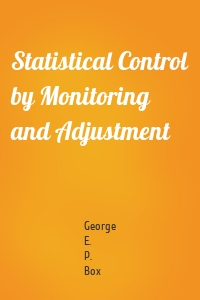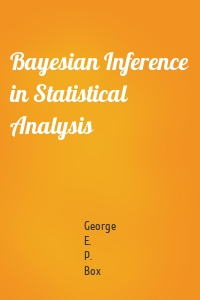George E. P. Box
5 кн.
An Accidental Statistician
Celebrating the life of an admired pioneer in statistics In this captivating and inspiring memoir, world-renowned statistician George E. P. Box offers a firsthand account of his life and statistical work. Writing in an engaging, charming style, Dr. Box reveals the unlikely events that led him to a career in statistics, beginning with his job as a chemist conducting experiments for the British army during World War II. At this turning point in his life and career, Dr. Box taught himself the...
| Автор | George E. P. Box |
Time Series Analysis
Praise for the Fourth Edition “The book follows faithfully the style of the original edition. The approach is heavily motivated by real-world time series, and by developing a complete approach to model building, estimation, forecasting and control." – Mathematical Reviews Bridging classical models and modern topics, the Fifth Edition of Time Series Analysis: Forecasting and Control maintains a balanced presentation of the tools for modeling and analyzing time series. Also describing the latest...
| Автор | George E. P. Box |
Response Surfaces, Mixtures, and Ri...
The authority on building empirical models and the fitting of such surfaces to data—completely updated and revised Revising and updating a volume that represents the essential source on building empirical models, George Box and Norman Draper—renowned authorities in this field—continue to set the standard with the Second Edition of Response Surfaces, Mixtures, and Ridge Analyses, providing timely new techniques, new exercises, and expanded material. A comprehensive introduction to building...
| Автор | George E. P. Box |
Statistical Control by Monitoring a...
Praise for the First Edition «This book . . . is a significant addition to the literature on statistical practice . . . should be of considerable interest to those interested in these topics.»—International Journal of Forecasting Recent research has shown that monitoring techniques alone are inadequate for modern Statistical Process Control (SPC), and there exists a need for these techniques to be augmented by methods that indicate when occasional process adjustment is necessary. Statistical...
| Автор | George E. P. Box |
Bayesian Inference in Statistical A...
Its main objective is to examine the application and relevance of Bayes' theorem to problems that arise in scientific investigation in which inferences must be made regarding parameter values about which little is known a priori. Begins with a discussion of some important general aspects of the Bayesian approach such as the choice of prior distribution, particularly noninformative prior distribution, the problem of nuisance parameters and the role of sufficient statistics, followed by many...
| Автор | George E. P. Box |






